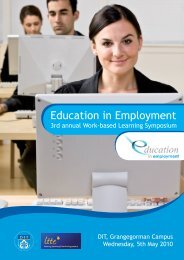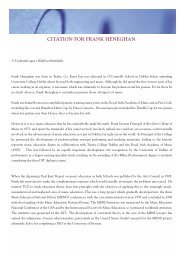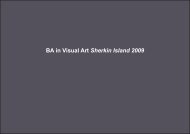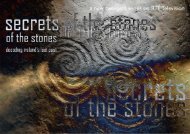TWICE THE SIZE - DIT Update - Dublin Institute of Technology
TWICE THE SIZE - DIT Update - Dublin Institute of Technology
TWICE THE SIZE - DIT Update - Dublin Institute of Technology
You also want an ePaper? Increase the reach of your titles
YUMPU automatically turns print PDFs into web optimized ePapers that Google loves.
Value systems <strong>of</strong> societies can be described by two dimensions: (1) traditional/secular-<br />
rational and (2) survival/self-expression values. As nations develop economically their<br />
value systems become more secular-rational and more emphasis is placed on self-<br />
expression.<br />
At present, Irish society has a quite unique combination <strong>of</strong> fairly strong traditional values<br />
with well developed self-expression values. As the period <strong>of</strong> cultural modernisation<br />
progresses, the values <strong>of</strong> Irish people will move away from those that emphasise traditional<br />
centralised control and concern for economic betterment towards values based on<br />
rationality and a concern for personal self-development and self-expression.<br />
This shift in value systems will create potential conflicts between rural-based Western<br />
regions seeking to preserve the status quo and urban-based Eastern regions seeking a more<br />
autonomous, responsive, rational and effective mode <strong>of</strong> politics and governance.<br />
Potential<br />
Global population will increase significantly during the coming decades. An adequate<br />
strategic policy focus on a robust and accelerating external demographic pressure would<br />
create the possibility <strong>of</strong> rectifying Ireland’s current low population density. This in turn<br />
would assist in sustaining economic growth.<br />
Driving Forces <strong>of</strong> Change<br />
The exploration <strong>of</strong> the future <strong>of</strong> the gateways in Ireland is underpinned by a recognition<br />
that the 21 st century is a period <strong>of</strong> rapid change in which new discoveries, philosophies and<br />
technologies play an ever more prominent part in shaping social, economic and spatial<br />
development.<br />
The future will be shaped by a number <strong>of</strong> critical challenges that can be summarised under<br />
these headings: “too many people”; “not enough resources”; “it takes time”; “there will<br />
be new technologies”; “what’s the risk?”; “redefining the enemy”; “economics are<br />
complex”; “détente with dilemma”; “running the show”; and “there will be surprises”.<br />
The changes will take place in all areas <strong>of</strong> life: demography, economy, governance,<br />
environment, society and technology and they will affect global, national and local futures.<br />
No single driver will dominate, but each driver will have varying impacts at different times<br />
and different locations. The drivers are not necessarily mutually reinforcing; in some cases<br />
they will work against each other.<br />
Scenario Logics<br />
The alternative scenarios for the future <strong>of</strong> Ireland are built around nine scenario logics:<br />
globalisation, European cohesion, Irish stability, values, people, spatial patterns,<br />
competitiveness, sustainability and learning. In each scenario these logics play out<br />
differently.<br />
15








